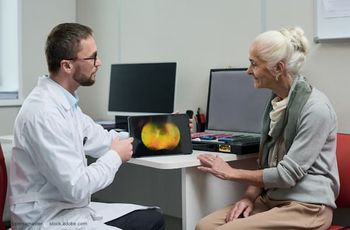
Q&A: David Liao, MD, PhD, presents the extended efficacy and safety of MCO-010 for RP
David S. Liao, MD, PhD, with Retina Vitreous Associates Medical Group in Los Angeles, California, spoke with Modern Retina at the 2025 annual scientific meeting of the American Society of Retina Specialists (ASRS). This event was held in Long Beach, California, from July 30 through August 2, 2025.
Liao gave a presentation at the meeting titled, "Extended efficacy and safety of MCO-010 optogenetic therapy for RP: 126-week results from the RESTORE follow-up study (REMAIN).
Note: The following conversation has been lightly edited for clarity.
Modern Retina: Your presentation discusses the most recent developments in MCO-010 as a treatment for retinitis pigmentosa (RP). Can you share this data with us?
David S. Liao, MD, PhD: I had the opportunity to present on some long-term follow-up data for MCO-010 in patients with advanced retinitis pigmentosa. So patients with advanced RP, vision no greater than 20/1600 were enrolled in 3 treatment groups, low-dose, high-dose, and sham, and they were followed after a single intravitreal injection up to 100 weeks in the original study and up to 2 1/2 years in the follow-up study. The results really show there are some meaningful improvements in vision. They're durable. The safety profile was favorable. So we're looking forward to the medication continuing to be developed and available to our patients with advanced RP.
MR: There are several gene therapies for inherited retinal diseases that are in development. How does this candidate, MCO-010, approach treating RP?
Liao: As we know, there are so many gene therapies coming up for inherited retinal disease; optogenetics is kind of unique in means of its action. It tries to make nonphotoreceptors sensitive to light. So this can be used in patients with advanced disease. It can be used irrespective of their underlying genetic mutation, so very novel. MCO-010 is unique. It targets bipolar cells. It's sensitive across the visible light spectrum, and uses ambient light. So I think it's a very elegant solution.
MR: What are the next steps for this continued research?
Liao: So based on the long-term follow-up study, they've actually submitted a rolling FDA biological licensing application (BLA). So that will be ongoing. Of course, it will depend on the FDA, but hopefully we'll know some more information, perhaps later next year (2026). I know they are planning on doing some additional studies to get more data on how this treatment performs.
MR: What hope does this MCO-010, as well as the other candidates that are in the pipeline, bring for patients with inherited retinal diseases?
Liao: For so long, as retina specialists, we've been seeing our patients with inherited retinal diseases. We've been telling them, "Oh, there'll be something in another 5 years. It'll be something in another 10 years." So something is on the horizon now. It's a meaningful step in vision. The patients, even though they had advanced vision loss, gained approximately 3 lines of Snellen equivalent vision. So this is promising. It's not going to be a cure-all for every patient. But this is another option, and really, it's going to be irrespective of your underlying genetic disease. So it will hopefully help a lot of these patients.
Newsletter
Keep your retina practice on the forefront—subscribe for expert analysis and emerging trends in retinal disease management.

































